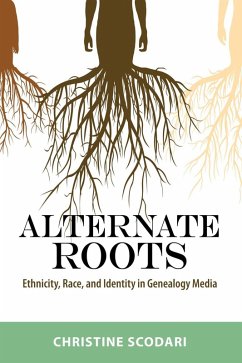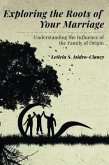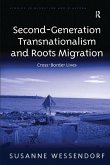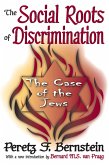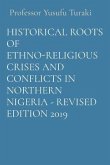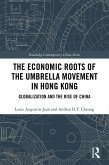In recent years, the media has attributed the increasing numbers of people producing family trees to the aging of baby boomers, a sense of mortality, a proliferation of Internet genealogy sites, and a growing pride in ethnicity. A spate of new genealogy-themed television series and Internet-driven genetic ancestry testing services have now emerged, capitIn recent years, the media have attributed the increasing numbers of people producing family trees to the aging of baby boomers, a sense of mortality, a proliferation of Internet genealogy sites, and a growing pride in ethnicity. A spate of new genealogy-themed television series and Internet-driven genetic ancestry testing services have now emerged, capitalizing on the mapping of the human genome in 2003. This genealogical trend poses a need for critical analysis, particularly along lines of race and ethnicity.
In contextual ways, as she intersperses an account of her own journey chronicling her Italian and Italian American family history, Christine Scodari lays out how family historians can understand intersections involving race and/or ethnicity and other identities inflecting families. Through engagement in and with genealogical texts and practices, such as the classic television series Roots, Ancestry.com, and Henry Louis Gates's documentaries, Scodari also explains how to interpret their import to historical and ongoing relations of power beyond the family. Perspectives on hybridity and intersectionality gesture toward making connections not only between and among identities, but also between localized findings and broader contexts that might, given only cursory attention, seem tangential to chronicling a family history.
Given current tools, texts, practices, cultural contexts, and technologies, Scodari's study determines whether a critical genealogy around race, ethnicity, and intersectional identities is viable. She delves into the implications of adoption, orientation, and migration while also investigating her own genealogy, examining the racial, ethnic experiences of her forebears and positioning them within larger, cross-cultural contexts.
There is little research on genealogical media in relation to race and ethnicity. Thus, Scodari blends cultural studies, critical media studies, and her own genealogy as a critical pursuit to interrogate issues bound up in the nuts-and-bolts of engaging in family history.alizing on the mapping of the human genome in 2003. This genealogical trend poses a need for critical analysis, particularly along lines of race and ethnicity.
In contextual ways, Christine Scodari lays out how family historians can understand intersections involving race and/or ethnicity within families. Through engagement in and with genealogical texts and practices, such as the classic television series Roots, Ancestry.com, and Henry Louis Gates' documentaries, Scodari also explains how to decipher their import to historical and ongoing relations of power beyond the family. Perspectives on hybridity and intersectionality gesture toward making connections not only between and among identities, but also between localized findings and broader contexts that might, given only cursory attention, seem tangential to chronicling a family history.
Given current tools, texts, practices, cultural contexts, and technologies, Scodari's study determines whether a critical genealogy around race, ethnicity, and intersectional identities is viable. She delves into the implications of adoption, orientation, and migration while also investigating her own genealogy, examining the racial, ethnic experiences of her forebears and positioning them within larger, cross-cultural contexts.
There is little research on genealogical media in relation to race and ethnicity. Thus, Scodari blends cultural studies, critical media studies, and her own genealogy as a critical pursuit to interrogate issues bound up in the nuts-and-bolts of engaging in family history.
In contextual ways, as she intersperses an account of her own journey chronicling her Italian and Italian American family history, Christine Scodari lays out how family historians can understand intersections involving race and/or ethnicity and other identities inflecting families. Through engagement in and with genealogical texts and practices, such as the classic television series Roots, Ancestry.com, and Henry Louis Gates's documentaries, Scodari also explains how to interpret their import to historical and ongoing relations of power beyond the family. Perspectives on hybridity and intersectionality gesture toward making connections not only between and among identities, but also between localized findings and broader contexts that might, given only cursory attention, seem tangential to chronicling a family history.
Given current tools, texts, practices, cultural contexts, and technologies, Scodari's study determines whether a critical genealogy around race, ethnicity, and intersectional identities is viable. She delves into the implications of adoption, orientation, and migration while also investigating her own genealogy, examining the racial, ethnic experiences of her forebears and positioning them within larger, cross-cultural contexts.
There is little research on genealogical media in relation to race and ethnicity. Thus, Scodari blends cultural studies, critical media studies, and her own genealogy as a critical pursuit to interrogate issues bound up in the nuts-and-bolts of engaging in family history.alizing on the mapping of the human genome in 2003. This genealogical trend poses a need for critical analysis, particularly along lines of race and ethnicity.
In contextual ways, Christine Scodari lays out how family historians can understand intersections involving race and/or ethnicity within families. Through engagement in and with genealogical texts and practices, such as the classic television series Roots, Ancestry.com, and Henry Louis Gates' documentaries, Scodari also explains how to decipher their import to historical and ongoing relations of power beyond the family. Perspectives on hybridity and intersectionality gesture toward making connections not only between and among identities, but also between localized findings and broader contexts that might, given only cursory attention, seem tangential to chronicling a family history.
Given current tools, texts, practices, cultural contexts, and technologies, Scodari's study determines whether a critical genealogy around race, ethnicity, and intersectional identities is viable. She delves into the implications of adoption, orientation, and migration while also investigating her own genealogy, examining the racial, ethnic experiences of her forebears and positioning them within larger, cross-cultural contexts.
There is little research on genealogical media in relation to race and ethnicity. Thus, Scodari blends cultural studies, critical media studies, and her own genealogy as a critical pursuit to interrogate issues bound up in the nuts-and-bolts of engaging in family history.
Dieser Download kann aus rechtlichen Gründen nur mit Rechnungsadresse in A, D ausgeliefert werden.

